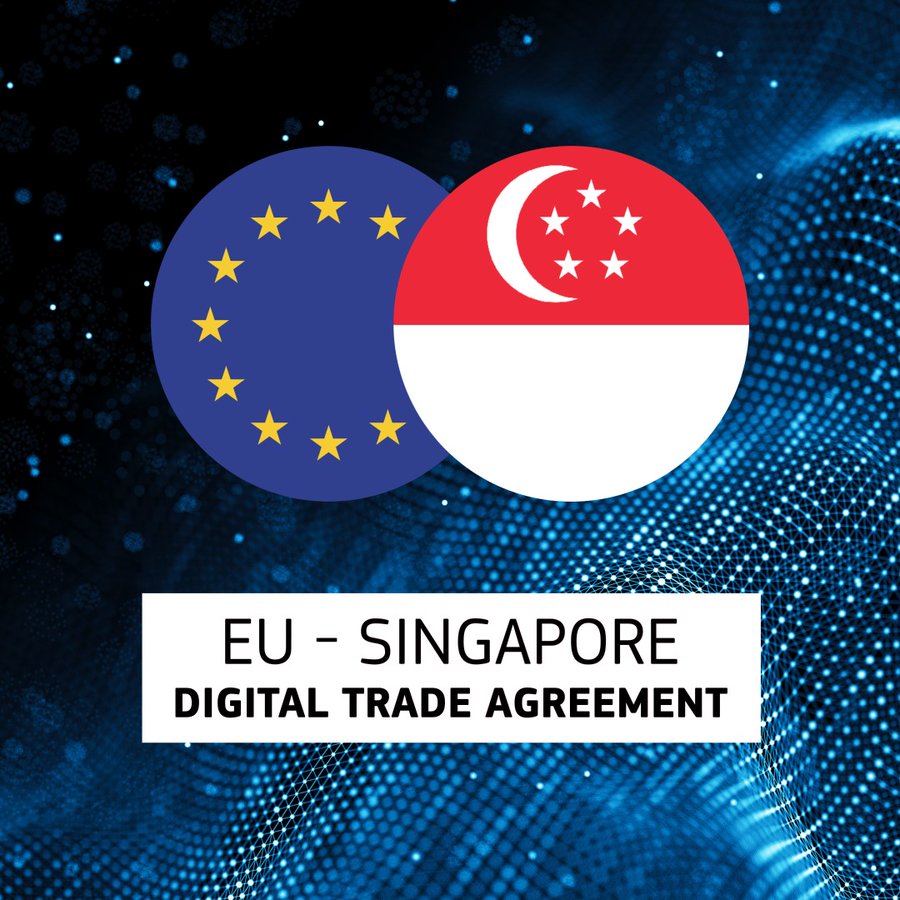
Singapore and the European Union (EU) have concluded a digital trade agreement the EU-Singapore Digital Trade Agreement (EUSDTA). The framework for the agreement was signed in February 2023, marking the first steps towards its completion.
The EUSDTA aims to promote more seamless cross-border trade between the two regions, further solidifying Singapore’s position as a digital trade hub. This agreement is particularly timely as businesses globally face increasing pressure to adapt to the digital economy. This also marks the fifth such agreement signed by the city-state.
Also known as a Digital Economy Agreement (DEA), these treaties are designed to establish rules for digital trade and facilitate collaborations in the digital economy between two or more countries. By entering DEAs with key partners, Singapore aims to develop international frameworks that promote the interoperability of standards and systems, thereby supporting businesses, particularly SMEs, in engaging in digital trade and e-commerce.
Singapore and the EU share a robust trading relationship with the EU-Singapore Free Trade Agreement coming into force in 2019. The EU was Singapore’s fourth-largest goods trade partner in 2023 with trade reaching more than S$105 billion (US$80.3 billion). Moreover, the EU was Singapore’s second-largest services trade partner for the same year with trade reaching S$98 billion (US$74.9 billion).
What are the key features of the EUSDTA?
Facilitating digital trade
Through the EUSDTA, Singapore and the EU will adopt internationally recognized e-payment systems. The two jurisdictions also encourage innovations and competition in the payment services sector.
Measures for implementing e-invoicing
Singapore and the EU will support measures that implement and develop e-invoicing strategies to drive the effectiveness, transparency, and accuracy of digital trade.
Custom duties
Singapore and the EU will not impose customs duties on electronic transmissions.
Paperless trading
The DEA will enable electronic import, export, and transit of goods documents. The electronic versions can serve as the legal equivalent of the paper versions.
Facilitating open and secure data flows
Cross-border data flows
Singapore and the EU will enable businesses to transfer their data seamlessly across each other’s territories thus removing unnecessary trade barriers.
Personal data protection
Both territories will maintain a legal framework to protect individuals’ personal data. Further, Singapore and the EU will publish information on personal data protection measures, such as how individuals and businesses can comply with legal requirements.
Open government data
Making government data accessible in digital formats promotes economic growth, social development, competitiveness, productivity, and innovation. To encourage the use of publicly available government data, particularly by small and medium-sized enterprises (SMEs), Singapore and the EU will collaborate to enhance and create opportunities for business and research.
Secure digital payment systems
Cybersecurity
Singapore and the EU will work together to identify and mitigate cybersecurity threats while also strengthening the capabilities of their workforce.
Source code
To encourage innovation and to ensure that source codes used by businesses are protected, Singapore and the EU will not require the transfer of or access to source code as a condition of market access.
Consumer protection
To strengthen consumer protection, Singapore and the EU will implement and uphold measures to prevent fraudulent, misleading, or deceptive commercial activities that could harm consumers participating in electronic commerce.
Promoting greater access and opportunities in the digital economy for businesses
Singapore and the EU will collaborate to share information and best practices on leveraging digital tools and technology to boost SMEs’ participation in digital trade opportunities.
Source: ASEAN Briefing
Share: